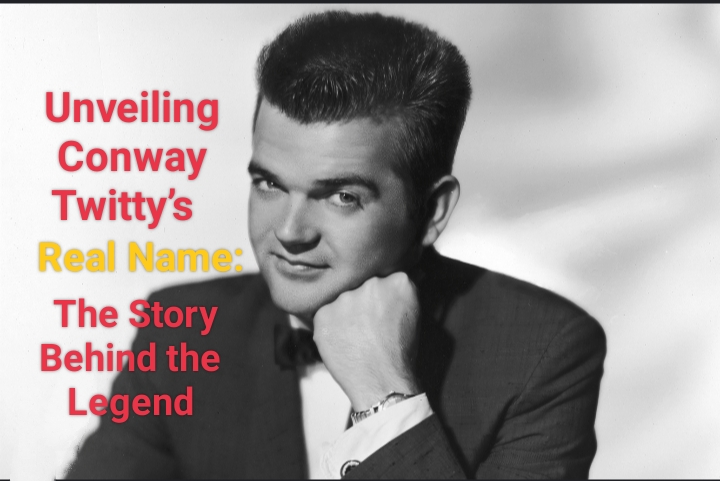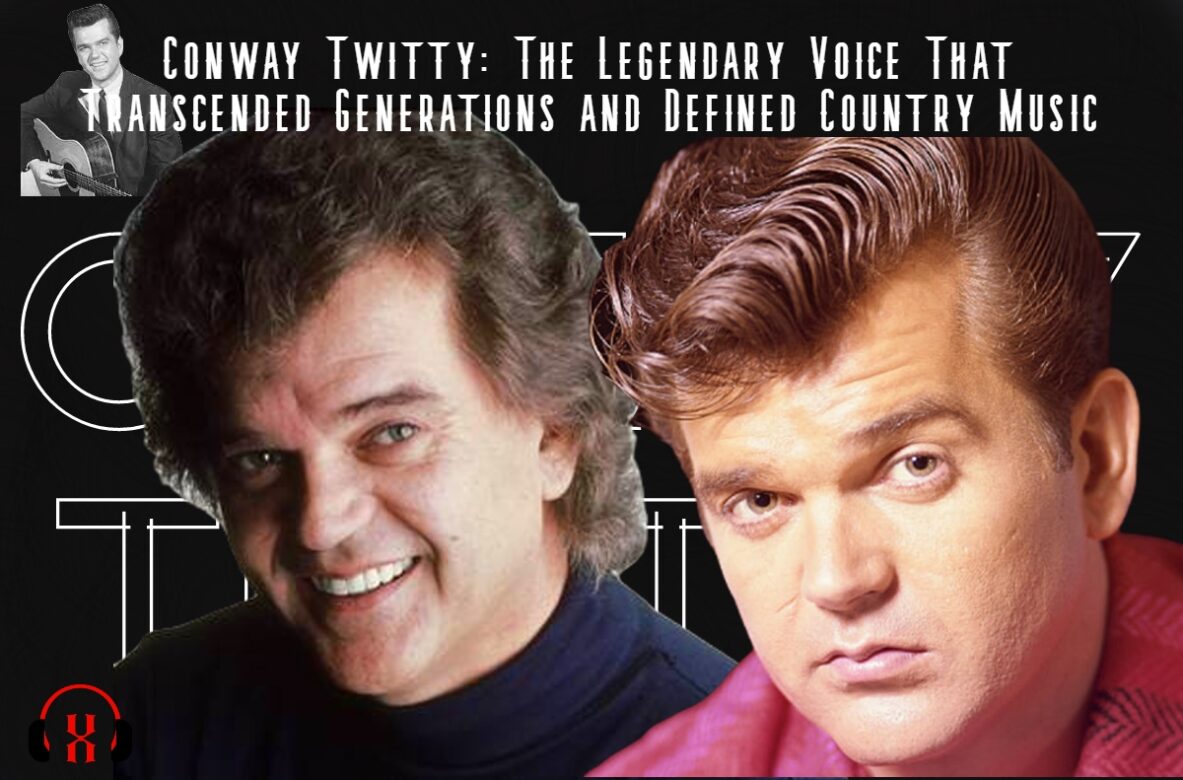![]()
Harold Lloyd Jenkins, popularly known as Conway Twitty, was an iconic American singer and songwriter who made significant contributions to the music industry. Although he started his career in the rockabilly scene of the 1950s, Twitty found his true calling in country music. His collaborations with Loretta Lynn earned him a series of prestigious awards from the Country Music Association between 1971 and 1976. In recognition of his immense talent, Twitty was honored with inductions into both the Country Music and Rockabilly Halls of Fame.
One of Twitty’s notable trademarks was his ability to infuse romance and sentimentality into his songs. His devoted fanbase, often likened to a fervent religious following, led comedian Jerry Clower to dub him “The High Priest of Country Music.” This title eventually became the name of his 33rd studio album, further solidifying his status as a beloved figure in the industry. Twitty rose to stardom with unforgettable hits like “Hello Darlin’,” “You’ve Never Been This Far Before,” and “Linda on My Mind.” Remarkably, he dominated Billboard’s Hot Country Songs chart an astonishing 40 times throughout his career, a record that remained unbroken for two decades until George Strait surpassed it. Twitty also achieved a notable feat by topping the Billboard Hot 100 chart with his song “It’s Only Make Believe.” Furthermore, he exhibited his songwriting prowess by penning eleven of his chart-topping hits on the Billboard Hot Country Songs.
Conway Twitty’s musical journey was a testament to his exceptional talent and enduring appeal. His heartfelt lyrics and captivating performances continue to resonate with audiences to this day. The influence of his remarkable career and the legacy he left behind are testaments to his rightful place in the annals of music history.
Early Life
Conway Twitty, originally named Harold Lloyd Jenkins, was born on September 1, 1933, in Friars Point, Mississippi. His family, with Welsh ancestry, named him after the renowned silent movie actor, Harold Lloyd, who was his great-uncle’s favorite. At the age of 10, the Jenkins family relocated to Helena, Arkansas, where young Jenkins formed his first singing group known as the Phillips County Ramblers.
With a passion for music, Jenkins hosted his own local radio show every Saturday morning and also enjoyed playing baseball. However, his life took a different turn when he was drafted into the U.S. Army and stationed in the Far East. It was during his time in the military that he organized a musical ensemble called the Cimmerons to entertain his fellow soldiers.
A neighbor named Wayne Hause recognized Jenkins’ potential in the music industry and encouraged him to pursue it. Inspired by Elvis Presley’s hit song “Mystery Train,” Jenkins began writing rock-and-roll music. Eager to find the perfect sound, he ventured to the renowned Sun Studios in Memphis, Tennessee, where he had the opportunity to collaborate with the owner and founder, Sam Phillips.
Although Jenkins’ recordings at Sun Studios were not released at that time, his composition “Rockhouse” was recorded by Roy Orbison and issued on SUN 251 as the B-side to “You’re My Baby” in 1956.
Conway Twitty’s early experiences and collaborations laid the foundation for his future success in the music industry. The journey from his humble beginnings in Mississippi to his ventures in Memphis would set the stage for his rise to fame as one of the most celebrated artists in American music history.

Choosing a Memorable Stage Name
In 1957, Harold Lloyd Jenkins, the talented singer, decided that his birth name lacked the memorability required for show business. Seeking a more captivating and unique stage name, Jenkins stumbled upon inspiration while perusing a road map. His eyes fell upon the names Conway, Arkansas, and Twitty, Texas, and thus, Conway Twitty was born. This revelation was confirmed by Twitty himself during an appearance on the David Letterman Show on March 30, 1989. With his new moniker in place, Twitty embarked on a journey to carve his name into the music industry.
Early Career and the Breakthrough
In 1957, under his newly adopted stage name, Twitty signed a brief recording contract with Mercury Records. Unfortunately, his singles failed to make an impact on the charts or resonate with audiences. However, Twitty’s fortunes took a turn for the better in 1958 when he joined MGM Records. It was during this time that fate intervened and a radio station in Ohio decided to take a chance on his music.
Rather than playing the A-side of his single, “I’ll Try,” which had garnered little attention, the radio station instead chose to play the B-side, “It’s Only Make Believe.” This song was a creation that had emerged during one of Twitty’s performances in Hamilton, Ontario, where he and drummer Jack Nance were playing at the Flamingo Lounge. To their delight, the record gradually climbed the charts, eventually reaching the pinnacle of success. “It’s Only Make Believe” spent a remarkable amount of time at the top spot on the Billboard pop music charts in the United States and achieved number one status in 21 other countries. The song’s immense popularity propelled Twitty into the spotlight, marking the first of his nine top-40 hits. With over four million copies sold, “It’s Only Make Believe” was honored with a gold disc by the Recording Industry Association of America (RIAA).
Recognition and Musical Evolution
The success of “It’s Only Make Believe” not only solidified Twitty’s position in the music industry but also attracted the attention of Tabby West, a country singer associated with ABC-TV’s Ozark Jubilee. Recognizing Twitty’s immense talent, West wasted no time in booking him to appear on the popular show.
Interestingly, due to Twitty’s vocal similarities to Elvis Presley, many listeners initially believed that “It’s Only Make Believe” was a hidden Presley recording released under the pseudonym Conway Twitty. Nonetheless, Twitty’s unique sound and style captivated audiences, leading to further success in the realm of rock and roll. Notable hits such as “Danny Boy” and “Lonely Blue Boy” solidified his status as a rock-and-roll artist, with the latter originally recorded by Presley for the film King Creole but ultimately left off the soundtrack. Inspired by “Lonely Blue Boy,” Twitty affectionately named his band the Lonely Blue Boys, who later evolved into the Twitty Birds. As his career progressed, Twitty expanded his musical horizons, delving into genres such as R&B and blues, while his music continued to resonate with audiences worldwide.
Conway Twitty’s ability to reinvent himself and adapt to evolving musical trends cemented his status as a remarkable artist. From his early struggles to his breakthrough moment with “It’s Only Make Believe,” Twitty’s journey remains an inspiring testament to perseverance and passion in the face of adversity.
Country Music Career
Conway Twitty, originally known for his rock and roll music, made a successful transition to country music in 1965. Despite initial resistance, Twitty’s talent and determination led to a series of hits on the country music charts. His breakthrough came with the release of “Hello Darlin'” in 1970, which became one of his most recognizable songs. Collaborating with Loretta Lynn, Twitty achieved great success as a vocal duo, winning multiple awards. He continued to dominate the country music scene with chart-topping hits like “You’ve Never Been This Far Before” and a string of consecutive top 10 singles. Twitty’s career spanned various record labels, including Decca Records and MCA, where he consistently delivered chart successes. His impact on country music is evident through his remarkable achievement of 55 number-one hits, leaving a lasting legacy in the genre.

Personal Life
Conway Twitty, the renowned country music artist, had an eventful personal life. He had a total of four marriages to three different women. His first marriage to Ellen Matthews, which lasted from 1953 to 1954, was a result of her pregnancy with their son, Michael. Twitty’s longest marriage was with Temple “Mickey” Medley, whom he married in 1956. Together, they had three children: Kathy, Joni Lee, and Jimmy Twitty. Although they divorced in the early 1970s, they remarried later that same year. However, after 28 years of on-and-off marriage, the strain of Twitty’s frequent absences led to their final divorce in 1984. Tragically, Mickey Twitty passed away in 2021. In 1987, Twitty married Delores “Dee” Henry, his 36-year-old office secretary, who became his widow in June 1993.
Throughout his recording career, Twitty resided primarily in Oklahoma City from 1963 to 1972, later moving to Norman, Oklahoma. He frequently performed at the Diamond Ballroom and even opened one of his Twitty Burger restaurants in Oklahoma City.
In 1981, Twitty experienced a significant accident when he slipped and hit his head while exiting his tour bus. This incident reportedly led to a noticeable change in his personality, according to family members and those close to him.
Twitty also served on the board of directors for Country Music Television (CMT) from 1984 to 1988. During this time, he was involved in the acquisition of CMT by the Music Village Group. Twitty’s dedication to the music industry extended beyond his own career, as he actively contributed to the growth of CMT and the development of Music Village USA. In 1989, Twitty City and Music Village were sold, leading Twitty to focus on performing in the flourishing Branson market, where he entertained sold-out crowds. Just before his passing in June 1993, Twitty finalized a deal with Nyhl Henson and his team to establish a new musical venue for Conway Twitty in Branson.
Death
Tragedy struck the music industry on June 4, 1993, when Conway Twitty fell ill during a performance at the Jim Stafford Theatre in Branson, Missouri. Shortly after the show, he collapsed on his tour bus, prompting immediate medical attention. Rushed to a nearby hospital, Twitty underwent surgery, but sadly succumbed to an abdominal aortic aneurysm in the early hours of the following morning. Cox South Hospital in Springfield, Missouri, became the place where this legendary artist, aged 59, took his last breath. Notably, Loretta Lynn, his frequent duet partner and chart-topping collaborator, happened to be at the hospital, supporting her husband Doo’s recovery from heart surgery. She caught a glimpse of Twitty as he entered the medical facility.
Two months after his passing, Twitty’s final studio album, aptly titled “Final Touches,” was released, leaving fans with one last musical gift. The album served as a poignant reminder of his exceptional talent and marked the end of an era. Paying tribute to the late artist, George Jones included a cover version of Twitty’s timeless hit, “Hello Darlin’,” on his own album “High-Tech Redneck” just four months after Twitty’s untimely departure.
In honor of his legacy, Conway Twitty was laid to rest at Sumner Memorial Gardens in Gallatin, Tennessee. His final resting place is a red granite vault bearing his birth name, Harold L. Jenkins. Adjacent spaces are reserved for his wife and son, ensuring that their family bond remains unbroken even in eternity. The grave serves as a timeless memorial to a legendary figure in the realm of country music.
click here for more about Conway Twitty..






